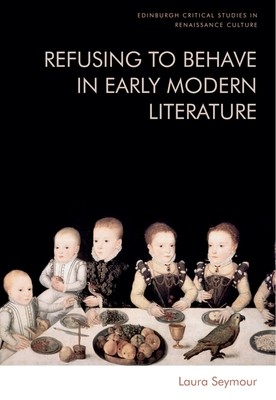
- We will send in 10–14 business days.
- Author: Laura Seymour
- Publisher: Edinburgh University Press
- ISBN-10: 1474491804
- ISBN-13: 9781474491808
- Format: 15.6 x 23.4 x 1 cm, kieti viršeliai
- Language: English
- SAVE -10% with code: EXTRA
Reviews
Description
Refusing to Behave in Early Modern Literature explores texts shaped by collisions between the idiosyncrasies of individual bodyminds and the values of small communities such as religion, sect, social milieu, congregation and family. The book encompasses the period from the late sixteenth century to the early eighteenth century, examining early modern shrew and devil plays, picaresque and rogue literature, and Quaker life-writing. Refusing to Behave examines the ways in which Thomas Dekker, Thomas Ellwood, Mateo Alemán and his translator James Mabbe, and the anonymous author of Grim the Collier of Croydon use textual tricks to provoke bodily responses in readers, and also draw on readers' bodily experiences to enrich their textual descriptions. This study broadens the scope of current understandings of early modern literature by identifying and analysing the significance of genre to representations of resistance to behavioural norms.
EXTRA 10 % discount with code: EXTRA
The promotion ends in 23d.10:46:18
The discount code is valid when purchasing from 10 €. Discounts do not stack.
- Author: Laura Seymour
- Publisher: Edinburgh University Press
- ISBN-10: 1474491804
- ISBN-13: 9781474491808
- Format: 15.6 x 23.4 x 1 cm, kieti viršeliai
- Language: English English
Refusing to Behave in Early Modern Literature explores texts shaped by collisions between the idiosyncrasies of individual bodyminds and the values of small communities such as religion, sect, social milieu, congregation and family. The book encompasses the period from the late sixteenth century to the early eighteenth century, examining early modern shrew and devil plays, picaresque and rogue literature, and Quaker life-writing. Refusing to Behave examines the ways in which Thomas Dekker, Thomas Ellwood, Mateo Alemán and his translator James Mabbe, and the anonymous author of Grim the Collier of Croydon use textual tricks to provoke bodily responses in readers, and also draw on readers' bodily experiences to enrich their textual descriptions. This study broadens the scope of current understandings of early modern literature by identifying and analysing the significance of genre to representations of resistance to behavioural norms.


Reviews